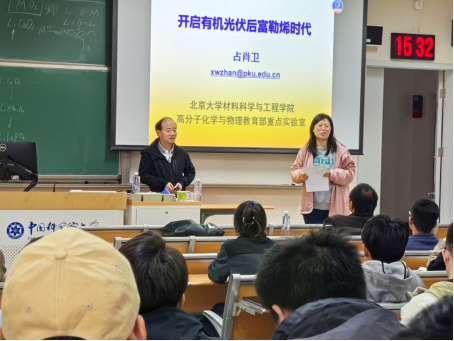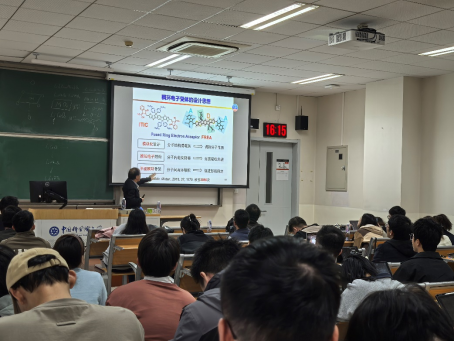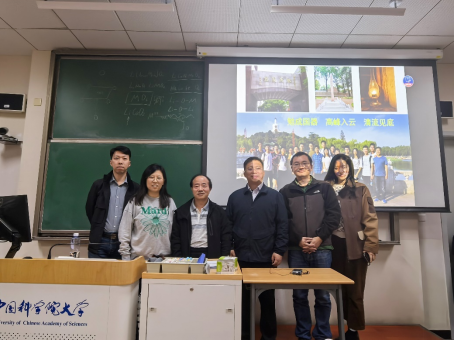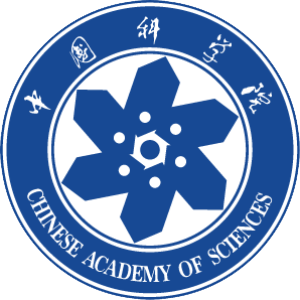At 15:30 p.m. on October 31, 2024, Professor Zhan Xiaowei from the School of Engineering/School of Materials Science of Peking University was invited by Professor Huang Hui and Shi Qinqin to give a lecture on the theme of "Opening the Post-Fullerene Era of Organic Photovoltaics", which was held in room 214 of the Teaching Building 1.

Zhan Xiaowei is a Boya Distinguished Professor of Peking University, a recipient of the National Science Foundation for Distinguished Young Scholars, a Fellow of the Chinese Chemical Society, and a Fellow of the Royal Society of Chemistry. 1986-1990, B.S., Department of Chemistry, Zhejiang University. 1993-1998, Ph.D., Department of Polymers, Zhejiang University. 1998-2002, Postdoctoral Fellow, Institute of Chemistry, Chinese Academy of Sciences. 1999, Visiting Scholar, Department of Chemistry, Hong Kong University of Science and Technology. 2002-2006, Research Associate/Research Scientist, Department of Chemistry, University of Arizona/Georgia Tech, USA. 2006-2012, Researcher, Institute of Chemistry, Chinese Academy of Sciences. 2012-present, Professor, School of Engineering/School of Materials, Peking University. He has been engaged in the research of organic polymer optoelectronic functional materials and devices for a long time, and has published more than 390 papers in journals such as Nature, which have been cited more than 56,000 times, and has been continuously selected as a global highly cited researcher since 2017. He has won the first prize of the Natural Science Award of the Ministry of Education and the second prize of the Beijing Natural Science Award (both of which are the first completers), the Youth Chemistry Award of the Chinese Chemical Society, the Honorary Award of the Polymer Science Invitation Report of the Chinese Chemical Society, the Outstanding Final Evaluation of the Hundred Talents Program of the Chinese Academy of Sciences, and the Outstanding Graduate Supervisor of the Chinese Academy of Sciences. He serves as a scientific editor/associate editor of Journal of Materials Chemistry A/C, and an editorial board/advisory editorial board member of 10 journals including ACS Energy Letters, Materials Horizons and Aggregate.

From 1995 to 2015, fullerenes have been dominating the electron acceptor materials in the field of organic photovoltaics, so these 20 years are called the "fullerene era". However, fullerenes have weak absorption in the visible region, large energy loss, and device efficiency has touched the ceiling. In addition, fullerene spherical molecules are easy to aggregate, the morphological stability is poor, and the lifetime of the device is limited. In response to the above problems, Professor Zhan introduced the "star molecule" ITIC invented by his team, which is known as a "milestone" and "epoch-making", which created a high-performance novel receptor system of "fused ring electron acceptor", opened the "post-fullerene era" in the field, broke through the bottleneck of organic photovoltaics, achieved a leap in device efficiency, and brought unprecedented new opportunities for the development of the field.

After that, Professor Zhan vividly introduced the application and future development direction of fused ring electron acceptor materials in the fields of organic/perovskite/quantum dot solar cells, photohydrolysis, field-effect transistors, photodetectors, light-emitting diodes, two-photon absorption, photothermal/ photoacoustic/photodynamic therapy, etc. He encouraged the students to look at scientific research from a long-term and scientific perspective, to carry out self-revolution from time to time, to persevere, and to be down-to-earth. Finally, the professor had an exchange and discussion with the teachers and students on the spot, and received a warm response from the teachers and students on the spot.
